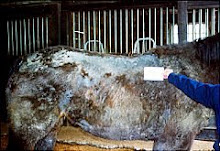
Track policy seeks to protect horses
By Bethania Palma Markus, Staff Writer
Posted: 11/30/2008 09:29:03 PM PST
Leigh Gray, president of the non-profit Thoroughbred Rehab Center, with rescued mare Another Variety. (Raul Roa / Staff Photographer)ARCADIA -- Trainers and owners found to have sent injured or retired racehorses to slaughter will be banned from running or stabling horses at Santa Anita Park under a new policy from Magna Entertainment Corp., the company that owns the track.
Santa Anita President Ron Charles said the track hopes to ensure the safety of its racehorses by closely monitoring injured or retired horses and keeping dealers known to sell horses for slaughter off the property.
"It's not perfect, but I think it's a great first step, and it's something that's long overdue," he said. "If we know a horse is injured, we're doing our best to make sure when it leaves we have a commitment from the trainer and owner that it's not heading for slaughter."
Charles said the policy was entered into the track's horseman's agreement, which governs racing terms and conditions. Track officials plan to work with horse retirement and rescue organizations to help keep racehorses from grisly fates.
Owners also have been asked to donate a small percentage of winning purses toward racehorse retirement, Charles said.
No one has been banned from the track for violating the policy as of yet, Charles said.
Similar policies have been implemented by East Coast tracks such as Suffolk Downs.
The move comes after the demise of some of the world's racing legends, including champion stallions Ferdinand and Exceller, outraged racing fans.
Both horses earned millions of dollars on the track
--------------------------------------------------------------------------------
Advertisement
--------------------------------------------------------------------------------
and changed hands several times after the end of their racing careers but ultimately ended up in foreign slaughterhouses.
While the last U.S. horse slaughterhouse was closed in 2007, the Humane Society of the United States said 2003 data from the U.S. Department of Agriculture indicated about 10 percent of the equines slaughtered were thoroughbreds.
The Humane Society estimated nearly 20 percent of all thoroughbreds bred for racing eventually were slaughtered. But some in the business of rescuing the animals say the percentage is higher.
Horse meat is eaten in some European and Asian countries, but the practice is taboo in the United States.
Some said selling horses to slaughter is a dark side of an industry that over-breeds the animals in search of the next star racer.
Caroline Betts, president of Southern California Thorougbred Rescue, said while domestic slaughterhouses are now closed, she often finds former race horses at auctions known for selling to "killer buyers" or dealers that ship the animals to slaughterhouses in Mexico and Canada.
"What typically happens in Southern California is horses are purchased very cheaply at auction," she said. "They're then resold to another dealer in New Mexico or Arizona and that person ships them to the border for the slaughterhouses."
Betts said the going price for a thoroughbred at some auctions can be as low as $200 or even less. More reputable auctions have raised the minimum price for horse sales to $500 to deter killer buyers, she said.
Many race horses can become riding, show, jumping or trail horses.
Leigh Gray, who runs the Thoroughbred Rehab Center in Bradbury, takes horses off the track, rehabilitates them, re-trains them and finds new homes for them.
Gray, a former exercise rider at Santa Anita and veterinary technician, has rehabilitated and placed hundreds of horses.
She currently is helping Super Strut, an 8-year-old gelding fresh off Santa Anita's track, overcome a leg injury. Gray said his owner wanted to ensure his well-being and turned him over to her nonprofit organization.
The big, gentle brown horse had 38 starts and won more than $500,000 on the race track.
"He'll make somebody a really nice riding horse or show horse," she said. "He needs to have his legs heal."
Rex Levi, 46, of Agoura Hills adopted a former race horse from Tranquility Farms, a Tehachapi-based rescue that specializes in thoroughbreds. He couldn't be happier with Mr. B, a 5-year-old gelding who raced as "Braggart."
"He's becoming a fine jumper, and we're having a blast," Levi said. "He's become a phenomenal horse and has far exceeded what I ever thought I'd get."
While many said the racing industry needs to do more to help its racetrack veterans, Charles said Santa Anita is taking steps.
"We need to do more to protect our athletes and our stars," he said. "It's really about public awareness and putting the trainers and owners on notice that we are taking this very seriously."
Click on title above to see article and leave comments;
http://www.pasadenastarnews.com/ci_11107842

















No comments:
Post a Comment